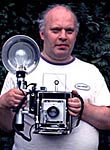|
|
 
|
|
Author
|
Topic: Recovering from Hard Drive Disaster
|
|
|
|
|
|
|
|
|
|
|
|
|
|
|
|
|
Ken Lackner
Phenomenal Film Handler

Posts: 1907
From: Atlanta, GA, USA
Registered: Sep 2001
|
 posted 12-21-2003 11:52 PM
posted 12-21-2003 11:52 PM




OK, what I mean by crash is this: My computer wouldn't boot one day last week. Windows couldn't find some file that it needed. My roomate took a look at it (he's a computer tech for a living) and he said probablly the partiton table took a dump. We took that drive out and he put it in his computer, but it showed up as a blank drive. At that point I figured the only thing I could do was repartion and reformat the drive, but neither fdisk nor Windows XP setup will partion it. Something is wrong with the drive. Whether it's a crashed head, bad spindle, or corrupted data, I don't know.
I use Roxio Direct CD for writing CD-R's, and the media I used were AT&T brand 80min/700MB 1X-40X compatible CD-R's. While I don't use a second hard drive to back up my data, I do maintain two sets of backups. I find it really strange that neither disc is readable. As far as trying other drives, I have tried both my CD-R and my CD-ROM drive (the disc should be readable in the CD-ROM if it was closed properly) and my roomates CD-R. Just like the hard drive, the CD showed up blank on his computer
| IP: Logged
|
|
|
|
Randy Stankey
Film God

Posts: 6539
From: Erie, Pennsylvania
Registered: Jun 99
|
 posted 12-22-2003 08:36 AM
posted 12-22-2003 08:36 AM




That's SORT OF good news, I guess.
If it was a seized spindle or a crashed head, the drive wouldn't run at all. The platters are turning and the heads are trying to find data but failing. Much of the data should still be there, on the drive, but not accessible by normal means. Sounds like a blown directory or something.
I can't tell you much about Windows disk formatting but if the drive was formatted in HFS (Mac format) I'd say you still have a ghost of a chance... at least enough of a chance that you ought to try to extract the data.
There are programs for the Mac, "Tech Tool", "Disk Warrior" and "Drive X" that attempt to extract the data from bad drives and in some cases can repair them, even. I don't see why there wouldn't be similar programs for PC drives. Doesn't "Norton" have something like that?
The way I figure it, you're in a no-lose situation. Unless you want to spend big bux to send the unit to "Drive Savers", your disk drive is toast, no? Anything you try to do to extract the data youself can only succeed or fail. If you succeed, you're back in business. If you fail you haven't lost anything.
What's "Norton", (et. al.) cost? Like, $100.00? It'd be a good investment for the future if nothing else.
| IP: Logged
|
|
Stephen Furley
Film God

Posts: 3059
From: Coulsdon, Croydon, England
Registered: May 2002
|
 posted 12-22-2003 09:23 AM
posted 12-22-2003 09:23 AM




Data recovery services are quite expensive, it's a skilled labour-intensive business, and Data tend to have a high value, so people are prepared to pay a high price for recovery. It would probably be possible to recover most of the data from your hard disk, but at a price.
I've lost a couple of CDRs, out of many hundreds written, but most don't get kept for more than a few years at most. They seem to be a bit like nitrate film, they can last for many years, and be fine; or they can be totally useless in a much shorter time. I have seen very cheap discs which are fine, and expensive ones which have failed, under the same storage conditions.
I would avoid packet writing software like Direct CD for making backups, actually I hardly ever use it for anything. I also avoid writing multi-session CDs. We once had a student who had written several sessions to a CD at home, with what software I don't know, and then asked one of our staff to add a few files in another session. I wouldn't have touched it, but he did. The result of this exercise was that the last session, but none of the files in it, was the only thing that was readable. After several hours, we managed to get the files back, and written onto a new CD. It is now departmental policy, that we do not add files, either in sessions or by packet writing to students' existing CDs. If we write to a new CD and something goes wrong then we haven't lost anything, we just do it again.
By far the most reliable way of writing to a CD is to use the 'Disc at once' format. Blanks are cheap enough now. (The first one I bought, many years ago, cost me 17 pounds! I'm paying less than 1% of that now.
| IP: Logged
|
|
|
|
|
|
|
|
All times are Central (GMT -6:00)
|
|
Powered by Infopop Corporation
UBB.classicTM
6.3.1.2
The Film-Tech Forums are designed for various members related to the cinema industry to express their opinions, viewpoints and testimonials on various products, services and events based upon speculation, personal knowledge and factual information through use, therefore all views represented here allow no liability upon the publishers of this web site and the owners of said views assume no liability for any ill will resulting from these postings. The posts made here are for educational as well as entertainment purposes and as such anyone viewing this portion of the website must accept these views as statements of the author of that opinion
and agrees to release the authors from any and all liability.
|

 Home
Home
 Products
Products
 Store
Store
 Forum
Forum
 Warehouse
Warehouse
 Contact Us
Contact Us




 Printer-friendly view of this topic
Printer-friendly view of this topic















![[Roll Eyes]](rolleyes.gif)



